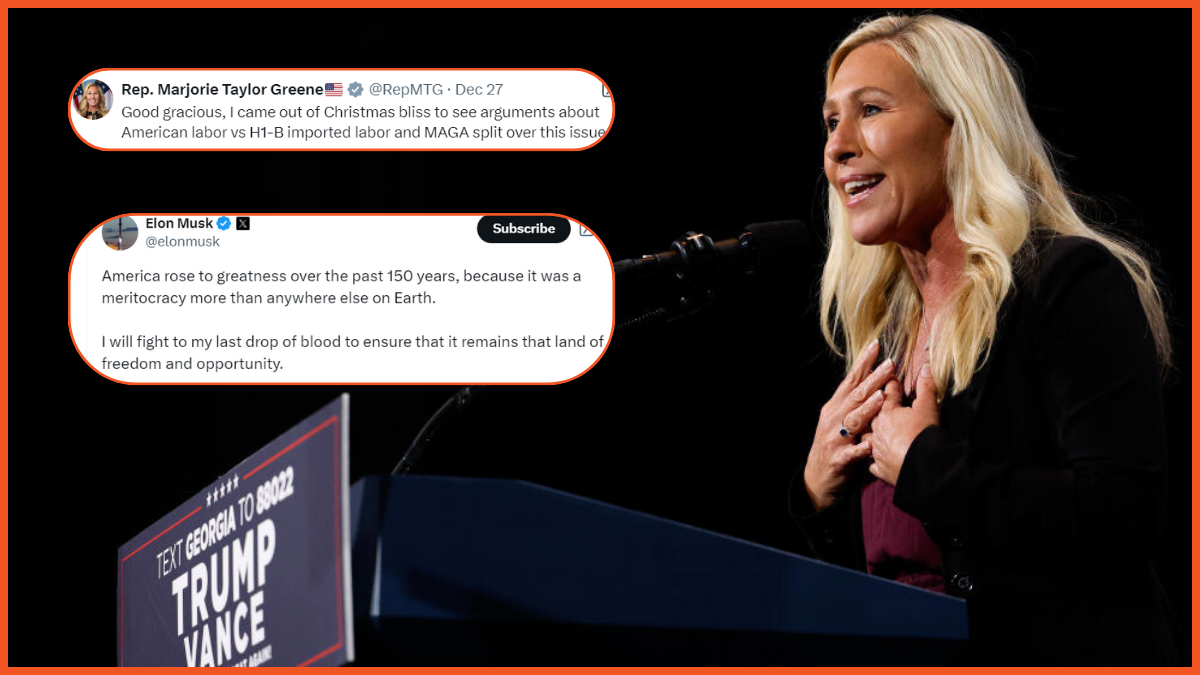For someone who tweeted, in Feb. 2023: “We need a national divorce. We need to separate by red states and blue states and shrink the federal government,” Marjorie Taylor Greene has been visited by karmic forces who decided to show her a different kind of breakup.
The disagreement within the MAGA movement appears to comprise the beginnings of a divorce, one likely unexpected to MTG. It’s a particularly ironic turn of events considering the Georgia Representative, not too long ago, was promoting the widening of the polarization gap by endorsing in the toxic public square that is X a Civil War-like secession between Republicans and Democrats.
It is highly problematic when a two-party system functions as little more than a childish game of tug of war where egos and lobbies play too large a part, it can result in real meaningful legislation that would make improvements in working-class civilians’ lives falling through for no morally upstanding reason.
We may well argue there is indeed no upstanding moral reason on either Vivek Ramaswamy, Elon Musk, and Donald Trump’s side, and the likes of MTG, Steve Banon, and Laura Loomer. Ultimately, their reasons for disagreeing with how H-1B visa policies ought to function, and the role they should ultimately play in the labor market, are either intrinsically self-serving, fallacious, out-of-touch, or xenophobic at their roots.
Get Ready for the next battle over ‘who constitutes a desirable immigrant’
Poor Marjorie had to be forced out of “Christmas bliss” upon finding her anti-migrant bubble burst. The immigration hard-liner is surely in the process of realizing that the DOGE tech bros are vouching for the exact opposite of what she wants when it comes to the immigration of highly skilled foreign workers.
South Africa-born Elon Musk and Vivek Ramaswamy, the child of Hindu Indian parents, are both self-entitled pro-meritocracy advocates of opportunity. In their case, their motivations are twofold: first, unlike MTG, given their roots in foreign countries, they both can perceive in their own empirical experiences the value of their work in America (from their perspective at least), thus, they are less likely to be moved by purely xenophobic motives.
What most moves them, however, is the prospect of employing “the best of the best” for their respective businesses, while affording to pay less for their labor. H-1B visa workers are not in the same position of stability as U.S. nationals. These employees have little to no safety nets to fall back on, thus, they agree to put their laboriously honed technical skills to work for a smaller amount than others would reasonably feel entitled to.
On Saturday, Dec. 28, the New York Post exclusively reported that President-elect Donald Trump offered his two cents to the work visa controversy while on call:
“I’ve always liked the [H-1B] visas, I have always been in favor of the visas. That’s why we have them. I have many H-1B visas on my properties. I’ve been a believer in H-1B. I have used it many times. It’s a great program.”
This position is at odds with quite a few Trump loyalists who are finally forced to face glimpses of how wishy-washy the President-elect can be with his promises of policy change:
We hate to give Laura Loomer credit for anything but, as she wrote in her tweet pushing back against the removal of her X blue check mark and monetization privileges, Trump hadn’t been as positive regarding H-1B visas in the past, including during his first presidency.
The pro-H-1B visa position conspicuously clashes with MTG’s “America first” views. Her solution to the lack of the kind of skilled workers people like Musk desperately want to further their business and entrepreneurial ventures is to push American youth towards careers she views as useful, “like engineering, and coding.”
There is something vindicating about observing the MAGA in-fighting over visa policies. However, we should never overlook the reasons and motivations at the heart of these MAGA factions’ disagreement. More often than not, their words ought not to be taken at face value, instead, their actions speak louder and their underlying motivations weigh heavier than pure semantics.
